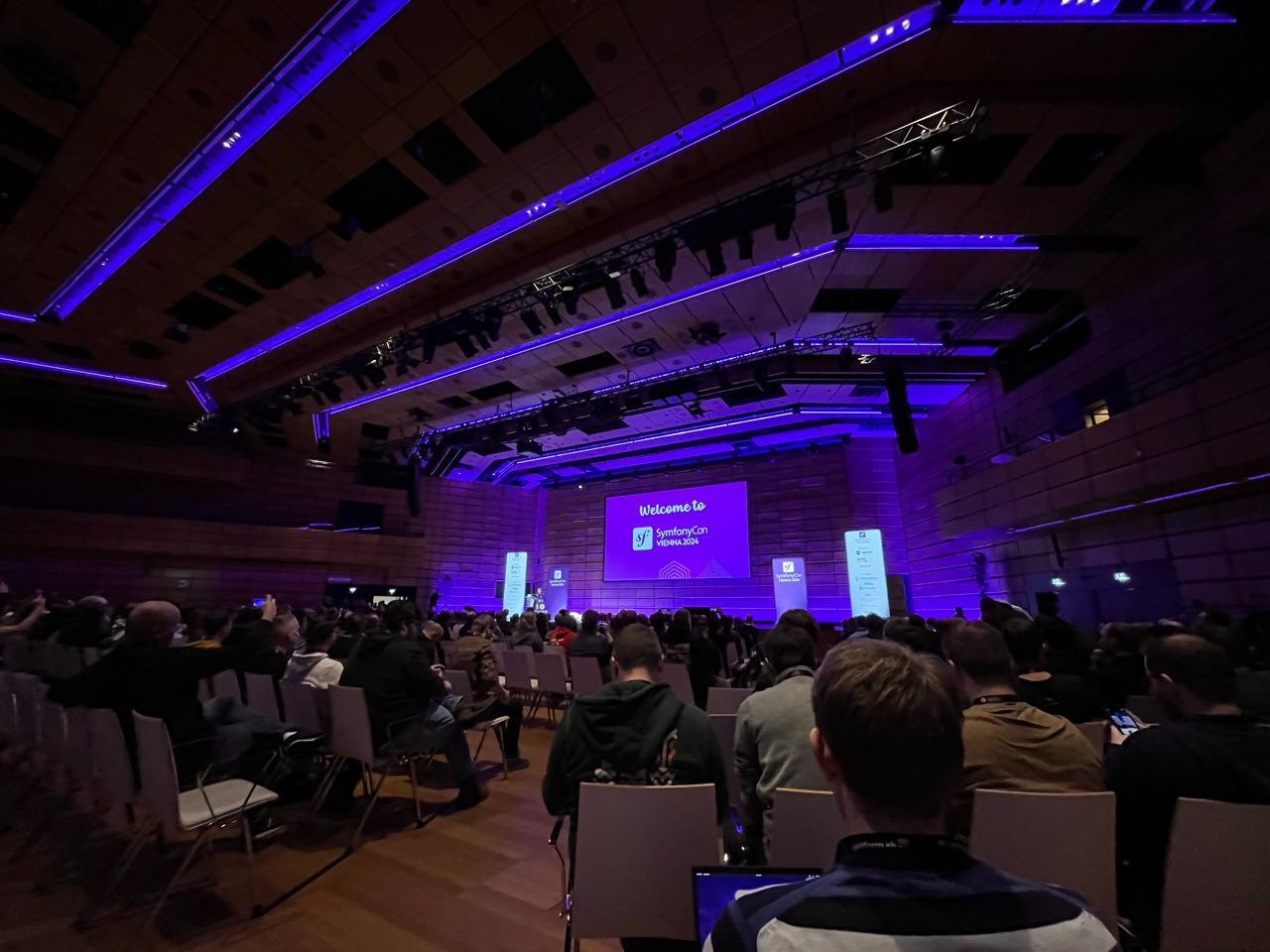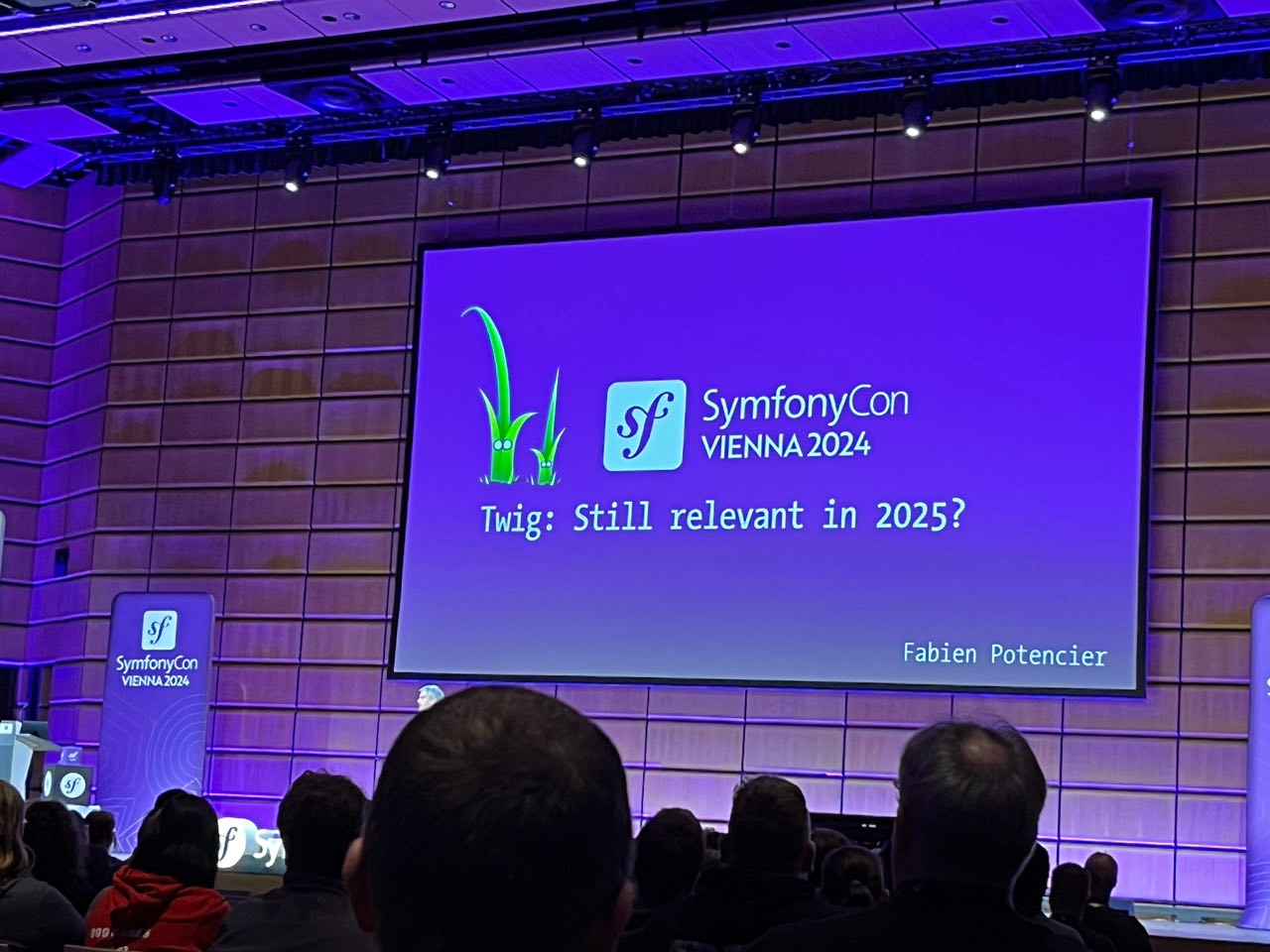SymfonyCon 2024: code in harmony
As developers, we like to stay informed about the technologies we use on a daily basis, so we regularly attend conferences. We recently headed to SymfonyCon, the premier annual event for the popular PHP framework.
The 2024 edition took place in beautiful Vienna, so one of our experts went to check it out. A quick night train journey and some culture later, they were ready to focus on two days packed with Symfony. What insights did we bring back as souvenirs? You can read all about it in this report!

Day 1
The first day immediately brought some practical eye-openers, from classics like Twig to experimental features such as JSON streaming.
The power of Twig: More than just templating
The keynote by Symfony creator Fabien Potencier, which opened the conference, was entirely dedicated to Twig, the templating engine that has been around for 15 years.
In an era of React frontends, Fabien made a strong case for Twig's continued relevance. Thanks to integrations like htmx, continuous refactoring, and additions such as 'template cache hot reload' and chain cache, Twig continues to evolve. Even operator precedence is getting an update in version 4.x. The ultimate proof that solid technology and innovation can go hand in hand.
HTTP compression: Speed gains on the web
A website needs to load fast, period. This talk provided a clear refresher on HTTP compression. Gzip is the familiar standard, Google’s Brotli is already supported by 98% of browsers, and Zstandard (from Facebook) offers the best compression and speed but still has some catching up to do in terms of browser support (70%). Carefully weighing these options helps us make web applications even more performant.
JSON streaming: Big data without memory problems
Anyone working with large datasets knows the problem: Out-Of-Memory errors when serialising JSON. Mathias Arloud introduced symfony/json-streamer, a new experimental package that uses a smart encoder and ObjectMapper. This allows you to get a 'streamed' response, helping you avoid memory issues with very large objects. Very interesting for the data management applications we build at Codana!
Audit logging: Who did what and when?
Traceability is key for quality software. Sebastian Plagemann delved into audit logging: how do you efficiently track changes made to your data? He showed how you can use the Doctrine Event System to automatically maintain detailed logs for every database operation. Essential for knowing who changed what and ensuring the integrity of your data.
Networking among the dinosaurs
SymfonyCon is more than just inspiring talks. The organisers had a pleasant surprise in store: an evening opening at the Naturhistorisches Museum (Natural History Museum). Chatting with peers amidst the T-Rex and butterfly collections, that's at least as valuable. Sharing knowledge and making new contacts in a unique setting, that's what we love!

Day 2
The second day also offered a great mix of in-depth technical insights and practical tips.
Composer behind the scenes
Almost every PHP developer uses Composer, but how does it work exactly? Nils Adermann lifted a corner of the veil. He explained why composer update often caused memory problems (OOM) in version 1 and how version 2 solves this with a smarter 'pool builder' and 'pool optimiser'. Good to understand what's happening under the bonnet and why updates to our tools are useful.
API choice stress: GraphQL, REST or RPC?
The eternal question: which type of API do you choose? Rob Allen listed the pros and cons of GraphQL, REST, and RPC. In short: GraphQL is great if you need specific data (faster on the client-side), while REST/RPC are often faster on the server-side but send more data. So, no universal answer, but important factors to consider when designing our APIs and data integrations.
ModelFlow AI: Connect with ease
AI is everywhere, including in the Symfony world. Andreas Wachter (known for SULU CMS) presented ModelFlow AI: a new package that makes it super easy to connect various AI platforms (like OpenAI, Claude, ...) to your application. Thanks to adapters, you can easily switch between them. Ideal for those who, like us, are experimenting with different language models without losing time on configuration.
Recharged and ready for the future
SymfonyCon Vienna was another resounding success. We returned with heads full of new ideas, practical tips, and interesting contacts. The ideal input to make our projects even better and offer our clients even more value. Next year, the conference will be closer to home, in Amsterdam. We're already looking forward to it!






